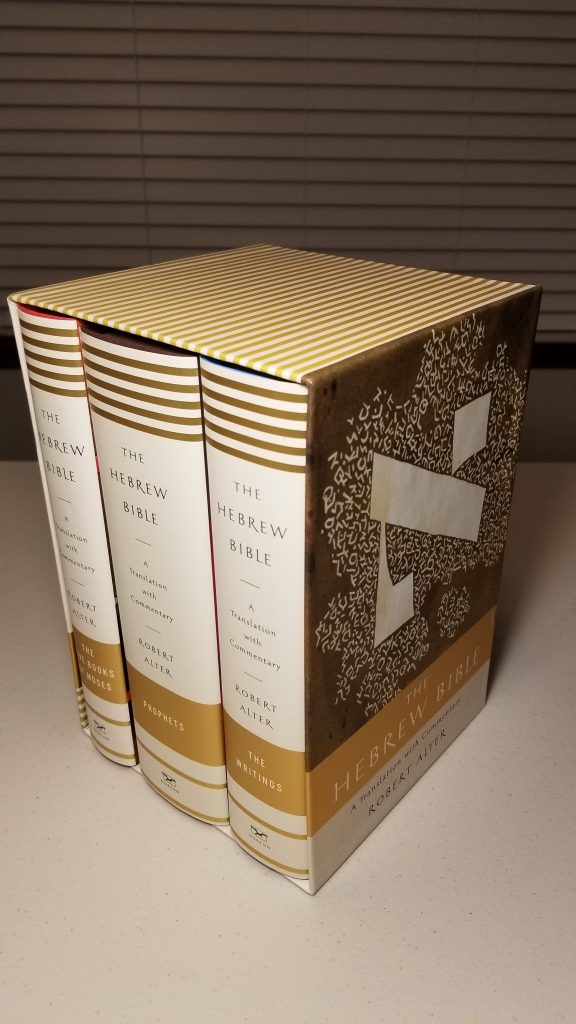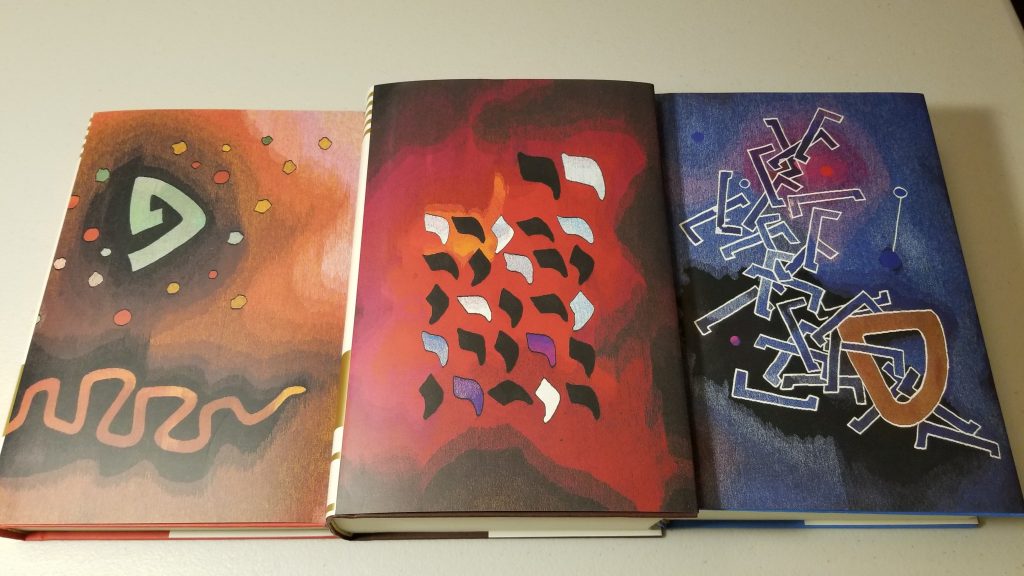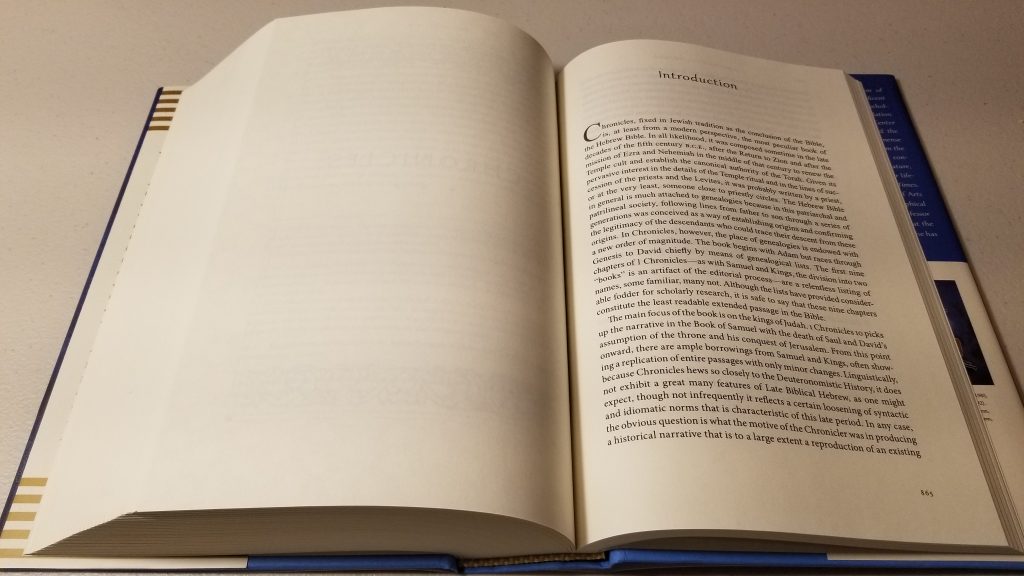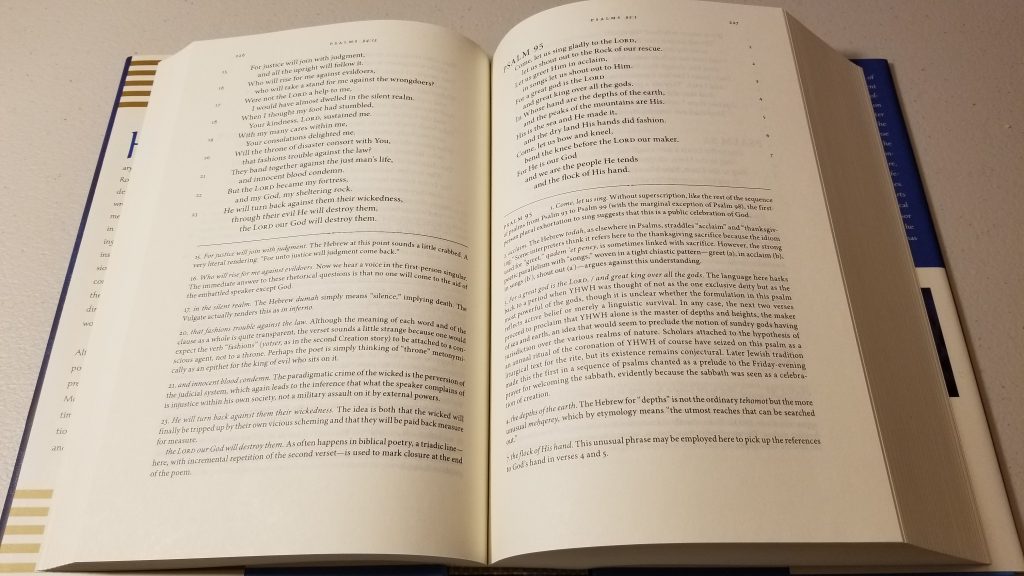I just received my pre-ordered copy of Robert Alter’s complete translation of the Hebrew Bible. If you’re unfamiliar with Alter’s work, check out the pre-release announcement I made here.
The translation and commentary are divided into three hardcover volumes: The Five Books of Moses (Genesis through Deuteronomy), The Prophets (the major and minor prophets, as well as Joshua, Judges, 1 & 2 Samuel, and 1 & 2 Kings), and The Writings (Psalms, wisdom literature, Lamentations, Ruth, Esther, Daniel, Ezra, Nehemiah, 1 & 2 Chronicles). Each volume measures approximately 6.5 inches wide by 9.5 inches tall. All three volumes fit into an included paperboard slip case.

Each of the volumes features excellent production quality. The bindings are sewn, the font is very readable, and most pages are line-matched. I’ve seen a few pages where the lines are not perfectly aligned with lines on subsequent pages, but they are the exception rather than the rule. The most striking feature is the paper. Most popular hardcover books feature paper that feels rough to the touch. When I first opened one of these volumes, I was struck by how smooth the paper was. Finally, each volume features unique cover art on its dust jacket. Here are the three side-by-side:


Robert Alter’s commentary is extensive throughout the translation. He offers introductions to each biblical book (or to a set of books, in the case of Ezra and Nehemiah, or 1 & 2 Kings for example). It’s quite common for half of any given page to be filled with footnotes. The photos below show the first page of the introduction to 1 & 2 Chronicles and a page from the Psalms showing the copious notes.


Each volume begins with Alter’s extensive preface to his translation, in which he explains his translation philosophy and offers multiple examples to illustrate the principles he intends to follow. He argues in-depth that most modern bible translations are impoverished by their single-minded focus on conveying the meaning of a text while ignoring its literary style and imagery. I’m looking forward to spending more time with this translation!
There is a very interesting interview, in the New York Times, with the author of this new English Translation of the Hebrew Bible. Specifically the interview focuses on the translation of the Hebrew word “Nefesh.” His view is that using “soul” for “Nefesh” is misleading. This article is well worth reading: https://www.nytimes.com/2018/12/20/magazine/hebrew-bible-translation.html?action=click&module=Well&pgtype=Homepage§ion=The%20New%20York%20Times%20Magazine
After reading the article I did a quick study of how some of the translations approach “Nefesh.” I used the online “Bible Gateway” program to do a word count study of the word “soul.” Initially, I just looked at Genesis as there is much to study about soul especially in the creation story and the animation of the body. Then I took a look at the whole O.T. Here are the results:
KJV “soul” appears 20 times in Genesis and 443 times in the O.T.
Doughy-Rheims “soul” appears 28 times in Genesis and 483 times in the O.T.
NKJV “soul” appears 10 times in Genesis and 289 times in the O.T.
RSV “soul” appears 5 times in Genesis and 188 times in the O.T.
NRSV “soul” appears 2 times in Genesis and 144 times in the O.T.
NIV “soul” appears 0 times in Genesis and 72 times in the O.T.
NABRE “soul” appears 0 times in Genesis and 157 times in the O.T.
Clearly, some of the translations did take a different approach to the meaning of the word “Nefesh;” perhaps in line with the thinking of the author of this new Hebrew Bible Translation.
(Note in the NY Times article the example cited regarding soul should be Jonah 2:5 not 2:6)
Thanks for sharing this info, Jim! It’s interesting to see the decline in the number of times “soul” appears with newer translations. The one anomaly I see in that pattern is the NABRE. It doesn’t use “soul” at all in Genesis, but it uses it more than twice as many times in the rest of the Old Testament compared with the NIV and 13 more times than the NRSV. I’m curious where the additional uses of “soul” appear in the NABRE. I have a sneaking suspicion that a number of them might be in the new NABRE Psalms.
I agree, the word soul is used 75 times in the Psalms. With the NABRE, the USCCB desired that at some point the new edition would be used in the liturgy. Thus, the translation required review by the Vatican in accordance with “Liturgiam Authenticam.” It was the Psalms that hit a roadblock with the Vatican and, I think it was 2-years of changes that delayed the publication. I would guess, that among many things, that “soul” was added back into the new translation. If the Motu Proprio “Magnum Principium” issued by Pope Francis; which gives Bishop’s Conferences far more power in approving translations been in effect, I think we would have a different set of NABRE Psalms.
I saw the article about Robert Alter in the NY Times. I hope my local library buys a copy because my budget doesn’t cover this.
So, what are you saying about Nefesh? It is translated differently based on the context from what I gather. Is your issue with the fact it doesn’t mean a separate spiritual being and that it basically means life breath? Please clarify.
Thanks.
A dissertation on “heart” in Augustine took me to a study of the OT’s use of the word. I discovered that there is no Hebrew word for soul, and I realized that that is because the Jews did not have to find a way to survive death, as the Greeks did in their body-soul composition of man. From the outset Judaism is a Covenant with a loving unique God Who doesn’t explain how it’s going to happen but promises that everything will be all right. For the Jew, the primary distinguishing element of man is heart, the drive of a person naturally oriented toward its Creator but subject to free choice. Heart is not exclusively feeling or soul or will, and it does not exclude or disdain the body. Heart is an integrative power–the authentic dynamism of the self–and supersedes any duality in the person. In his translation of the Psalms Alter very rightly translates nefesh as “[my] being”.